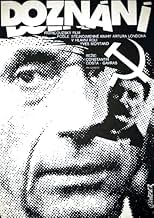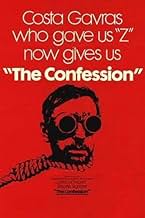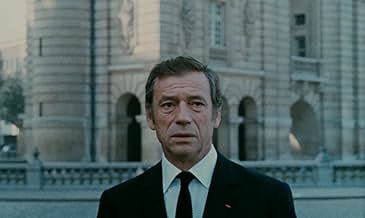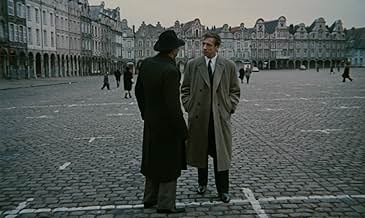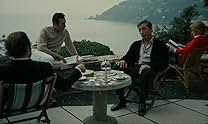L'aveu
- 1970
- Tous publics
- 2h 19min
NOTE IMDb
7,8/10
5,2 k
MA NOTE
Inspiré de l'histoire du communiste Artur London, Anton Ludvik est vice-ministre des Affaires étrangères de la Tchécoslovaquie. Il est arrêté et subira pendant l'enquête des tortures mentale... Tout lireInspiré de l'histoire du communiste Artur London, Anton Ludvik est vice-ministre des Affaires étrangères de la Tchécoslovaquie. Il est arrêté et subira pendant l'enquête des tortures mentales pour qu'il avoue sa trahison.Inspiré de l'histoire du communiste Artur London, Anton Ludvik est vice-ministre des Affaires étrangères de la Tchécoslovaquie. Il est arrêté et subira pendant l'enquête des tortures mentales pour qu'il avoue sa trahison.
- Réalisation
- Scénario
- Casting principal
- Nomination aux 1 BAFTA Award
- 3 victoires et 3 nominations au total
Avis à la une
"The Confession" is an uber-bleak film that stars Yves Montand as a loyal member of the Communist party who is turned on and made a scapegoat of when the party becomes paranoid about informers. He is imprisoned and systematically tortured until he admits to crimes against the party he didn't actually commit. Simone Signoret has a much smaller role as his wife, who sees her home invaded by Communist party thugs during the time in which her husband is in prison.
"The Confession" I think provides a good illustration of the pitfalls of Communism, which, despite its merits on paper, rarely works as an actual system. Those who adhere to it feel too persecuted to remain secure for long, and they turn against each other, convinced of double crossings and disloyalty to the party. It reminded me very much of the excellent novel "Darkness at Noon," which similarly examines the ways in which Communism eventually falls apart in practice.
I can't say I necessarily enjoyed "The Confession." It's extremely one-note; the film doesn't really have much of a dramatic arc. It's not able to marry the qualities of political expose and thriller the way another of director Costa-Gavras's classics, "Z," is. But I would still recommend it.
Grade: B+
"The Confession" I think provides a good illustration of the pitfalls of Communism, which, despite its merits on paper, rarely works as an actual system. Those who adhere to it feel too persecuted to remain secure for long, and they turn against each other, convinced of double crossings and disloyalty to the party. It reminded me very much of the excellent novel "Darkness at Noon," which similarly examines the ways in which Communism eventually falls apart in practice.
I can't say I necessarily enjoyed "The Confession." It's extremely one-note; the film doesn't really have much of a dramatic arc. It's not able to marry the qualities of political expose and thriller the way another of director Costa-Gavras's classics, "Z," is. But I would still recommend it.
Grade: B+
The split between Tito and Stalin (1948), in the late 1940s and early 1950s, was followed by show trials of prominent Communists all over Eastern Europe and the wave of Stalinist purges in which tens of thousands suffered or lost their lives. This movie is about the 1952 process in Prague, conducted against Rudolf Slánský and 13 other leading members of the Communist Party of Czechoslovakia (KSC). The main protagonist - Anton Ludvik, aka Gerard, is based on Arthur London, veteran of the Spanish Civil War and the French resistance movement, who, at the time of the arrest, was vice-minister of Foreign Affairs of Czechoslovakia and a senior official of KSC. Display of Stalinist torture and interrogation process in preparation for rigged political trial is very realistic. Based on actual events.
Anton Ludvik aka Gerard (Yves Montand) is the vice-minister of Foreign Affairs of Czechoslovakia. He is worried that he's being followed. Other officials are being picked up in a purge. He gets picked up by a dark militaristic organization. His family is harassed. His wife Londonova (Simone Signoret) struggles in her new circumstances. He is psychologically tortured to give false confessions.
This is basically two hours of movie confinement with his jailers doing all kinds of psychological warfare. At times, I feel like being tortured myself. There's good and bad in that. It doesn't make for a pleasant or necessarily a compelling viewing experience. It's more of a compelling academic exercise. This is the cinematic equivalent of stress position. The acting is impeccable and the production is first rate. It's Kafkaesque and a cry against totalitarianism.
This is basically two hours of movie confinement with his jailers doing all kinds of psychological warfare. At times, I feel like being tortured myself. There's good and bad in that. It doesn't make for a pleasant or necessarily a compelling viewing experience. It's more of a compelling academic exercise. This is the cinematic equivalent of stress position. The acting is impeccable and the production is first rate. It's Kafkaesque and a cry against totalitarianism.
Came across this excellent film tonight on the Turner Classic Movie channel. I won't rehash the film story here, it has been explained quite well by previous reviewers.
Want only to state that I first saw it when it was released back in 1970-71. I was a very young soldier then. The Vietnam war was still raging and the cold war with the Soviets and Warsaw Pact nations was very real. The Soviet invasion of Czechoslovakia in 1968 was still fresh in our minds.
Even though it is not entirely an anti-communist film, rather an honest look of what can and did go horribly wrong in soviet bloc countries, it was a chilling reminder to us of how frightening life could be in a totalitarian state.
Released here in the U.S. during a time of continued civil unrest and anti-war sentiment carried over from the late '60's, it was sort of a reality check to the growing affection for the left wing, socialist philosophy etc. among the younger generation.
Want only to state that I first saw it when it was released back in 1970-71. I was a very young soldier then. The Vietnam war was still raging and the cold war with the Soviets and Warsaw Pact nations was very real. The Soviet invasion of Czechoslovakia in 1968 was still fresh in our minds.
Even though it is not entirely an anti-communist film, rather an honest look of what can and did go horribly wrong in soviet bloc countries, it was a chilling reminder to us of how frightening life could be in a totalitarian state.
Released here in the U.S. during a time of continued civil unrest and anti-war sentiment carried over from the late '60's, it was sort of a reality check to the growing affection for the left wing, socialist philosophy etc. among the younger generation.
I saw this film last night and it has being going around in my head all day. It builds with a slow intensity which becomes absolutely compulsive. In style it reminded me a lot of The Godfather films. Calm, matter of fact but intensively observed portrayals of almost unbelievably hideous events. It has the same effect - if you stop to watch for just a few seconds, you are irresistibly drawn into the stream of events. Yves Montand is at his down beat best. What struck me most is that this true story of the post-way purges in the USSR's East European client states is of a time and place almost inconceivable to most of us now. The blind belief in The Party, the Inquisition-like mind games of the interrogators that convince the accused that to demonstrate their true loyalty to the Party, they must confess to the most ridiculous accusations of their betrayal of it. And I was surprised to see that it was made in 1971, the feel is absolutely contemporary, even though it depicts such far off events. While I was watching, I was convinced that I knew the story - isn't this the same as Koestler's 'Darkness at Noon'?
Le saviez-vous
- AnecdotesThe film was restored in 2014 by KG Productions with the support of the CNC under the supervision of Costa-Gavras by Éclair Group for the image and L.E. Diapason for the sound.
- ConnexionsEdited into Le tombeau d'Alexandre (1993)
- Bandes originalesL'Aveu (Générique)
Written by Giovanni Fusco
Meilleurs choix
Connectez-vous pour évaluer et suivre la liste de favoris afin de recevoir des recommandations personnalisées
- How long is The Confession?Alimenté par Alexa
Détails
- Date de sortie
- Pays d’origine
- Langues
- Aussi connu sous le nom de
- The Confession
- Lieux de tournage
- Grand Place, Arras, Pas-de-Calais, France(London seeing Kahoutek for the last time)
- Sociétés de production
- Voir plus de crédits d'entreprise sur IMDbPro
Box-office
- Montant brut aux États-Unis et au Canada
- 329 954 $US
Contribuer à cette page
Suggérer une modification ou ajouter du contenu manquant

